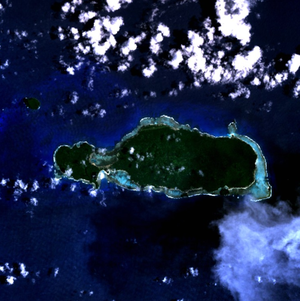This is an old revision of this page, as edited by Johnski (talk | contribs) at 00:40, 18 September 2005 (Fixed external link of Secessionist movements on Rotuma). The present address (URL) is a permanent link to this revision, which may differ significantly from the current revision.
Revision as of 00:40, 18 September 2005 by Johnski (talk | contribs) (Fixed external link of Secessionist movements on Rotuma)(diff) ← Previous revision | Latest revision (diff) | Newer revision → (diff)
Rotuma (including the islands of Hatana, Hofliua, Rotuma, Solkope, Solnohu and Uea) are volcanic islands of approximately 43 square kilometers, located at 12°35′S 177°10′E / 12.583°S 177.167°E / -12.583; 177.167, approximately 465 kilometers north of Fiji. Its population at the 1996 census was 2810.
History
- See main article: History of Rotuma
Rotuma was first sighted by Europeans in 1791, when captain Edward Edwards did so while searching with his ship HMS Pandora for the mutineers of the Bounty.
A favorite of whaling ships in need of reprovisioning, in the mid-nineteenth century Rotuma became a haven for runaway sailors, some of whom were escaped convicts. Some of these deserters married local women and contributed their genes to an already heterogeneous pool; others met violent ends, reportedly at one anothers' hands.
In the 1840s both Roman Catholics and Wesleyans established missions on the island. Conflicts between the two groups, fueled by previous political rivalries among the chiefs of Rotuma's seven districts, resulted in hostilities that led the local chiefs in 1879 to ask Britain to annex the island group. On May 13, 1881, an anniversary now celebrated as Rotuma Day, a public holiday, Rotuma was officially ceded to the United Kingdom, seven years after Fiji became a colony. The colonial legacy can still be seen today in the variety of old churches that dot the landscape.
Demographics
- See main article: Demographics of Rotuma
Although the island has been politically part of Fiji since 1881, Rotuman culture more closely resembles that of the Polynesian islands to the east, most noticeably Tonga, Samoa, Futuna, and Uvea. Because of their Polynesian appearance and distinctive language, Rotumans now constitute a recognizable minority group within the Republic of Fiji. The great majority of Rotumans (10,000) now live elsewhere in Fiji, with a little under 3000 remaining on Rotuma. Rotumans are culturally conservative and maintain their customs in the face of changes brought about by increased contact with the outside world.
Well-known Rotumans include Major Jioji Konousi Konroti, Fiji's High Commissioner to Australia, Ombudsman Walter Rigamoto, Information Minister Marieta Rigamoto, and Chief Justice Daniel Fatiaki.
Politics
- See main articles: Politics of Rotuma, Local government of Fiji
Administratively, Rotuma is fully incorporated into Fiji, but with local government so tailored as to give the island a measure of autonomy greater than that enjoyed by other political subdivisions of Fiji. Rotuma has the status of a Dependency, with an elected Council of Rotuma whose powers and responsibilities are comparable to those of Divisions and Provinces elsewhere in Fiji. The island's capital is Motusa.
At the national level, Fijian citizens of Rotuman descent elect one representative to the Fijian House of Representatives, and the Council of Rotuma nominates one representative to the Fijian Senate. Rotuma is also represented in the influential Great Council of Chiefs by three representatives chosen by the Council of Rotuma. For electoral purposes, Rotumans were formerly classified as Fijians, but when the Constitution was revised in 1997-1998, they were granted separate representation at their own request. (The majority of seats in Fiji's House of Representatives are allocated on a communal basis to Fiji's various ethnic groups.
Following two military coups in Fiji in 1987, a secessionist movement flickered into life on Rotuma. It has always appeared to represent a minority of the Rotuman population, however.
External links
- Rotuma website - a exhaustive website on all things Rotuman by anthropologists Alan Howard and Jan Rensel
- The Land Has Eyes - an award-winning film set in Rotuma made by Rotumans.
- Secessionist movements on Rotuma
| Polynesia | |
|---|---|
| Polynesian triangle | |
| Polynesian outliers | |
| Polynesian-influenced | |